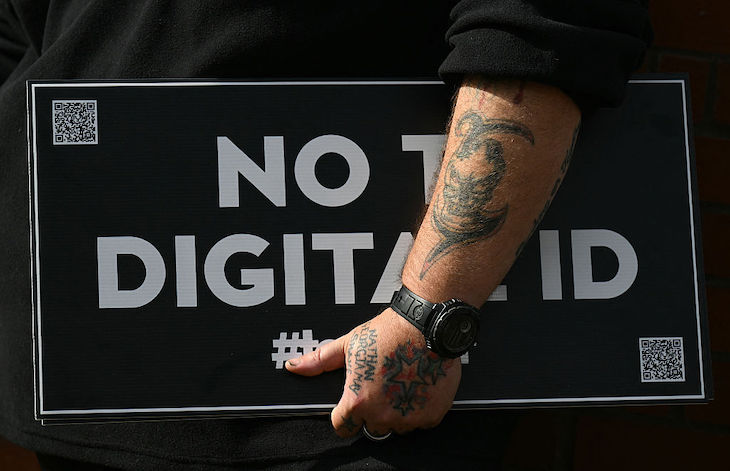There are times in politics when a feeling of dread overwhelms. When your boss wants to go down a path you think is wrong. Spring 2021 brought one such moment for me, as vaccine passports were dangled as the key to our pandemic freedom. I suspect the Technology Secretary, Liz Kendall, experienced a similar feeling when told to front the Prime Minister’s mandatory digital ID plan. The OBR revealed this week that that plan will likely cost taxpayers a staggering £1.8billion. Ministers must realise that Britain could do without Keir Starmer’s enormously expensive, unpopular and troubling scheme. But will any of them yet be telling their leader?
My suspicion is that Kendall gets it. Whenever it comes to justifying the scheme to MPs, she hides behind a pair of gigantic reading glasses
Let me take you back to covid times, if you can bear it, and my conflict with the decision of my then-boss, Michael Gove – at the time Chancellor of the Duchy of Lancaster, now of this parish. I was a junior minister at the Cabinet Office, and my Private Secretary relayed the latest from a meeting of officials. Word was that Michael wanted to press ‘go’ on vaccine certification. Anxiety began to gnaw deep into my stomach.
The idea of a vaccine passport had been floating around government for a few weeks as a tool to reopen our covid-ravaged economy. By the end of March, the ‘stay at home’ order had finally been lifted. But panic was starting to rise over a new covid strain from India, with images beamed to us of funeral pyres burning through the night. Against this backdrop, Michael was now privately proposing to tell Brits they could only go to the pub if a new government app confirmed a clear covid test or vaccination. Incidentally, this came not long after a pained national debate over whether scotch eggs counted as a substantial meal for the purpose of pub reopenings.
‘This is not the kind of future we should be building,’ I wrote in a note to myself. ‘We are biological beings and suddenly it has become socially unacceptable to carry the risk of any disease in our bodies.’
I wondered what to do. Since Michael always encouraged his ministers to ‘think in ink’, I eventually put pen to paper and wrote him five pages on why I feared his covid passport idea was a rotter. I say feared because I did not know for sure. It is easy to look back and judge Ministers for their decisions over covid. But where life and death is concerned, sincerely-held beliefs can get flung aside for good reason. I did not hold the burden of responsibility like Michael did. Nothing was clear cut.
‘The pandemic presents a tremendous philosophical challenge to our understanding of liberty,’ I suggested in my letter. ‘Are we in the West freer, in being ordered to stay at home, than those in authoritarian states who are closely monitored but may have greater every day freedoms as a result? To what extent does control of the individual liberate the majority?’
‘For me, it comes down to this’ I concluded. ‘We must govern with a sense of humility and a sense of proportion. The government has necessarily taken for itself a huge amount of power in managing the pandemic. The public has broadly been sympathetic to that. Nonetheless, the times we have lost their confidence, in my view, have been when that enormous power has been used without the requisite care, humility and proportion…‘
‘…I question whether covid certification would represent a humble use of our mandate, a proportionate response to health risk and a helpful tool to address a gap in our anti-covid arsenal, sufficiently compelling to overcome principled concerns about liberty. My nagging suspicion is that we have here an example of overreach, overhype and disproportion that will end up under-delivering on practical benefits.’
Into Michael’s red box the letter went.
He thanked me in his unfailingly polite way, and advised that the note had had an impact on his evolving thinking. In the end, I lost the internal argument: by December 2021, the scheme was in place, lasting in England all of six weeks as the miserable Christmas Omicron wave was battled. It proved effective only at cheesing everyone off, and vaccine passports were soon binned as we moved to the ‘living with covid’ phase of our grim national ordeal.
Over three years on, now Shadow Tech Secretary, I found myself on the green benches watching my opposite number, Liz Kendall look far into the distance as she wrestled against herself in justifying Starmer’s mandatory digital ID to parliament. Just before September’s reshuffle, the erstwhile Pensions Secretary had been attempting to get the nation’s unemployed into work as her government made it riskier and costlier to employ people amidst a welfare crisis. Now there she was, proposing to introduce another layer of friction by letting only those with a government-issued digital ID get a job. Never mind the digitally excluded that she claimed as her priority. Or, indeed, the bemused interrogations of Labour backbenchers, who pointed out that the dodgy plan was not in their manifesto.
The Prime Minister has primarily sold mandatory digital ID as a way to stop illegal migration. Keir Starmer has calculated that the failure by government to control our borders is now so profound that the British public is in ‘worth a shot’ territory on ID cards. I suspect by the end of this parliament, however, mandatory digital ID will have made no greater difference to Labour’s control of immigration than vaccine passports did in our fight against covid. Yet it will come to represent to voters an example of a government that used its enormous power without requisite humility or proportion, while the cost and complexity of the scheme balloons.
Tellingly, Starmer has now quietly shuffled his mandatory digital ID project away from Kendall and into the hands of Chief Stooge, Darren Jones
My suspicion is that Kendall gets it. Whenever it comes to justifying the scheme to MPs, she hides behind a pair of gigantic reading glasses while barely muttering about illegal migration. All practical questions of cost, purpose and security are dodged. She declines to say to which other areas of our lives Labour’s mandatory ID will be expanded. Instead, implicitly recognising her wobbly case, she markets it all as the friendly digital key to better online services – an easier way to find your library card.
It’s a neat trick, presenting doubters as stuck in the past. But it is a very deliberate attempt to conflate two different things. Better online services do not require the mandation of a government-issued digital ID. In the Cabinet Office, I worked on digital transformation of government, designing systems with choice, consent, and privacy in mind. Paper options retained, nobody forced down the digital route, and private identity providers – now absolutely hopping mad about Labour’s plan – very deliberately recognised as a way of giving citizens choice. The Association of Digital Verification Professionals has called what Labour inherited a world-leading model for data sovereignty that digitised liberty rather than diluted it. After a lot of painstaking work to improve government digital services, I confess to taking personal offence to Kendall’s painting of me as a Luddite. Labour has bowled in with its socialist, centralised identity plan and, at a stroke, undermined public trust and years of hard-won progress to improve online services.
Tellingly, Starmer has now quietly shuffled his mandatory digital ID project away from Kendall and into the hands of Chief Stooge, Darren Jones, in the Cabinet Office. While Jones has adopted the Kendall playbook of insisting the scheme is solely about improving services, he has gone further by saying that using a digital ID will be a personal choice. Either they are discreetly changing tack or Ministers are ignoring the obvious reality that, if it is mandated for employment, anyone who refuses to use it will simply be unable to get a job. We now wait to see whether the scheme survives a Labour leadership challenge or quietly dies in a corner along with the vaccine passport. Despite the OBR’s Budget cost assumptions, the fact remains that no new money has been set aside for it.
Before Labour MPs pour vast political capital and taxpayers’ money into Starmer’s digital ID dodo, they might pause to learn those lessons
Back in 2021, I suggested to Michael that he could use any climbdown on certification ‘as an opportunity to set out how we in the UK intend to use technology to empower rather than restrict the citizen in the technologically-enabled world that is unfolding before us.’ Today, as Shadow Tech Secretary, my belief in that approach endures as we apply Conservative principles to our developing tech policies.
Indeed that is one of the reasons why our Party is opposing mandatory digital ID cards in principle and in practice. The British public remains deeply sceptical of government competence and the security of its online systems. (It was hard not to laugh at a Chancellor insisting in her Budget speech that Labour can be trusted with mandatory digital ID when the government could not stop her entire plan from leaking). They are wary of growing power being concentrated in the hands of data holders and digital infrastructure providers. Many feel disempowered by the pace at which technology is reshaping the world around them.
But scepticism towards a mandatory digital ID does not mean acceptance of clunky or ineffective online services. The success of digital driving licences and the rapid improvements to passport applications were not Labour’s doing – they were achieved under our government.
Our approach was clear: digital identification should be a matter of choice – used voluntarily, for specific purposes, with user consent and only the necessary information shared. It means supporting private-sector innovation in identity services, not creating a state monopoly built on a centralised database. And it means preserving paper-based or in-person options for those who prefer them.
My opposition to covid certification may not have carried the day in 2021, but the scheme ultimately collapsed – unworkable, unpopular, and entirely ineffective in meeting its own objectives. On 8 December, MPs will finally have a chance to speak out against the plan when we debate the petition against mandated digital ID that attracted three million signatures. Before Labour MPs pour vast political capital and taxpayers’ money into Starmer’s digital ID dodo, they might pause to learn those lessons.







Comments